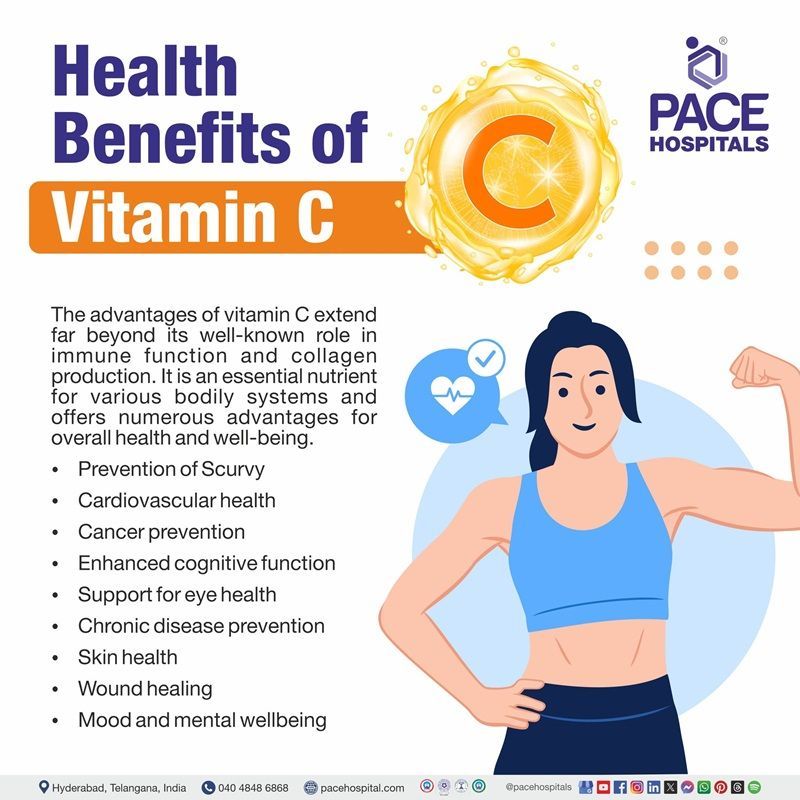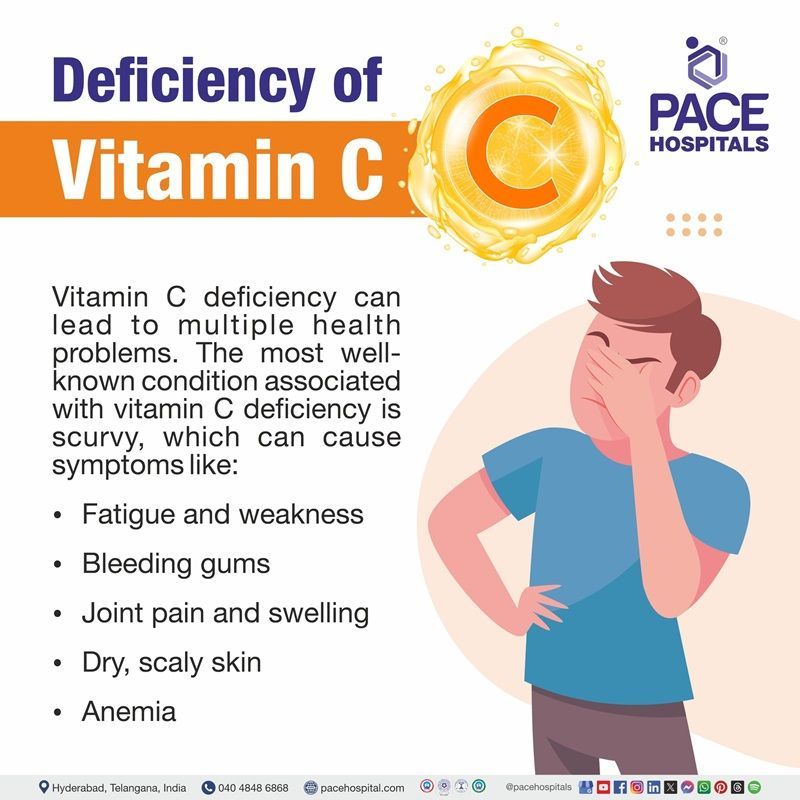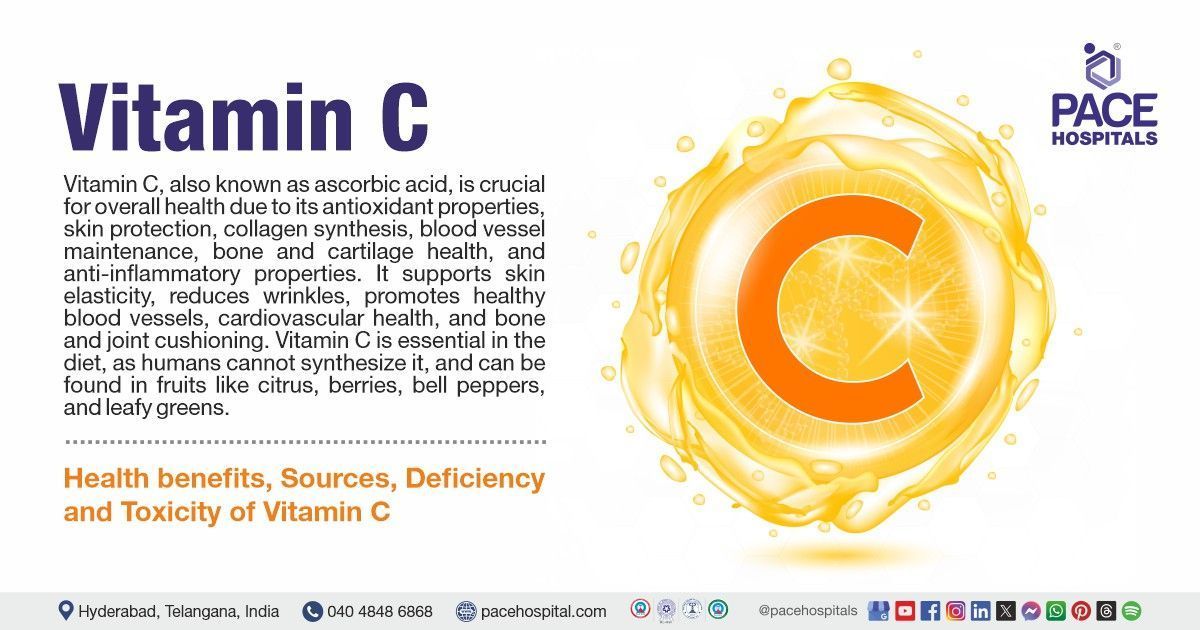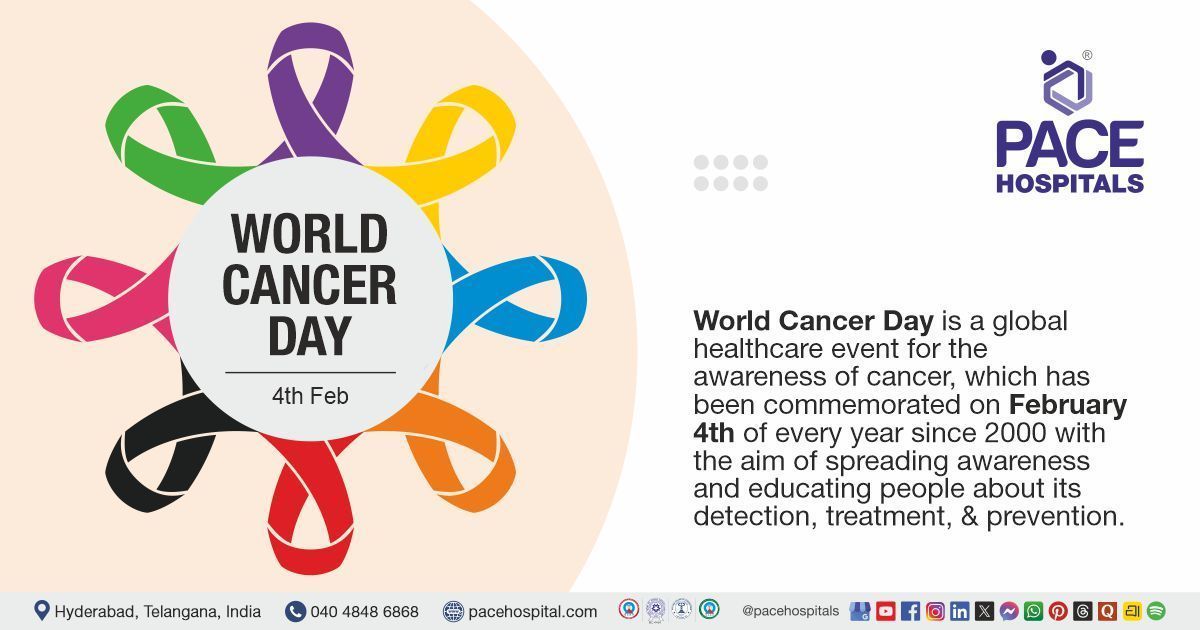Vitamin C - Top Sources, Health Benefits, and Deficiency Signs
PACE Hospitals
Vitamin C definition
Vitamin C, also know as ascorbic acid, is vital for overall health due to its numerous roles. It is a potent antioxidant that protects the skin from damage due to free radicals other than aiding in collagen synthesis, which supports skin elasticity and reduces wrinkles.
Furthermore, it is essential to maintain healthy blood vessels by promoting collagen and elastin production, contributing to better circulation and cardiovascular health.
Vitamin C also supports bone and cartilage health by helping form collagen, which is crucial for strong bones and joint cushioning. Its anti-inflammatory properties can decrease the chronic disease risk such as cardiac diseases,
diabetes, and few types of cancers. Since humans cannot synthesize vitamin C, it is essential to include it in the diet through fruits like citrus, berries, bell peppers, and leafy greens to ensure optimal health and prevent deficiencies.
Role of Vitamin C in the Body
Vitamin C is an essential nutrient for the overall health and playing a role in a wide range of physiological processes.
- Antioxidant properties: The antioxidant properties of vitamin C safeguards the body from the harmful effects of stress due to oxidation, which results from an imbalance between free radicals and antioxidants. This imbalance can lead to cell damage, aging, and chronic diseases like cancer, cardiovascular disease, and neurodegenerative disorders.
- Collagen synthesis: Collagen, a key structural protein in connective tissues like skin, tendons, ligaments, and cartilage, is essential for wound healing and tissue maintenance. Vitamin C, as a cofactor in collagen synthesis, is crucial for tissue repair and healthy skin, joints, and bones.
- Immune system support: Vitamin C plays a key role in immune system support. It increases the production and function of white blood cells, particularly neutrophils and lymphocytes, which are responsible for fighting infections. It also boosts the production of interferons, which help protect the body from viruses and other pathogens.
- Iron absorption: Increased absorption of non-heme iron, found in plant-based foods is done by this vitamin. Vitamin C helps prevent iron deficiency anemia by converting iron into a more absorbable form, especially in individuals following vegetarian or vegan diets. This is particularly important in populations at risk for iron deficiency, such as children, pregnant women, and individuals with poor dietary habits.
- Neurotransmitter synthesis: The C-vitamin is involved in the neurotransmitters production, which are chemicals that facilitate communication between nerve cells in the brain. These neurotransmitters include dopamine, which plays a role in mood regulation, motivation, and attention. Research suggests that vitamin C may help reduce the risk of psychological medical conditions such as depression and anxiety.
- Skin health: Vitamin C is widely recognized for its positive impact on skin health. It helps in the synthesis of collagen, which contributes to skin elasticity and wound healing. Additionally, vitamin C has been shown to reduce the wrinkles, fine lines, and ageing signs, by promoting skin regeneration and providing protection against UV-induced skin damage.

Role of Vitamin C in Diabetes
- Vitamin C is important in managing diabetes because of its antioxidant properties. It enhances insulin sensitivity, decreases oxidative stress, and helps lower blood glucose levels.
- Vitamin C serves as a protective barrier by helping to prevent complications related to cardiovascular, neuropathy, and nephropathy.
- It's essential to keep in mind that moderate supplementation of Vitamin C (ranging from 500 to 1,000 mg per day) or the inclusion of Vitamin C-rich foods, such as citrus fruits, berries, and broccoli, can have positive effects for individuals with diabetes. However, this should always be approached with medical guidance.
Vitamin C
Benefits
The advantages of vitamin C extend far beyond its well-known role in immune function and collagen production. It is an essential nutrient for various bodily systems and offers numerous advantages for overall health and well-being.
- Prevention of scurvy: Scurvy is a condition that results from a severe deficiency of vitamin C, leading to symptoms such as fatigue, swollen and bleeding gums, joint pain, and anemia. With the advent of vitamin C supplementation and fortified foods, scurvy has become rare in modern times. However, it still occurs in individuals with poor dietary habits, such as those with limited access to fresh fruits and vegetables.
- Cardiovascular health: Vitamin C has been linked to cardiovascular health, with studies suggesting that it may help reduce the risk of heart disease. It contributes to healthy blood vessels by strengthening collagen in the vascular walls, improving blood circulation, and preventing arterial plaque buildup. Furthermore, vitamin C may help lower blood pressure and decrease LDL cholesterol levels and triglycerides.
- Cancer prevention: Due to C Vitamin's antioxidant properties, it is thought to play a role in cancer prevention by protecting cells from oxidative damage that can lead to cancerous mutations. Some studies have shown that vitamin C may help restrict cancer cellular growth, although more research is needed to fully understand its potential as a cancer-fighting agent. It has also been suggested that vitamin C may enhance the effectiveness of cancer treatments like chemotherapy and radiation.
- Enhanced Cognitive Function: Vitamin C's antioxidant effects may have a positive impact on brain health. Vitamin C may help protect against cognitive decline and neurodegenerative conditions like Alzheimer's disease and Parkinson's disease, by reducing oxidative stress in the brain. Research has also shown that vitamin C may help improve memory and concentration, especially in individuals with low levels of this nutrient.
- Support for eye health: Vitamin C plays a role in maintaining eye health by preventing oxidative damage to the lens and retina. It has been shown to reduce cataracts risk and age-related macular degeneration (AMD), two common age-related eye conditions. Vitamin C's antioxidant properties safeguard the eyes from free radical damage, which can lead to the onset of certain eye conditions.
- Chronic disease prevention: Vitamin C, with its antioxidant properties, can lower blood pressure, improve endothelial function, and reduce heart disease risk. It may also lower certain cancer incidences by reducing oxidative DNA damage.
- Skin health: Beyond collagen production, Vitamin C has been studied for its ability to reduce skin damage from UV exposure. Its antioxidant capabilities help mitigate photodamage, leading to reduced pigmentation and improved skin texture. Topical Vitamin C formulations have gained traction in dermatology for their efficacy in addressing aging signs, including wrinkles and fine lines.
- Wound healing: The synthesis of collagen, enhanced with Vitamin C, is crucial for tissue repair. Supplementing with Vitamin C can expedite recovery from surgical procedures and injuries, emphasizing the need for adequate intake among athletes and post-operative patients.
- Mood and mental well-being: Some research suggests that individuals with low Vitamin C levels may experience higher rates of anxiety and depression. The connection between Vitamin C and neurotransmitter synthesis underscores its potential in mood enhancement.

Best Sources of Vitamin C
Since the human body cannot synthesize vitamin C, it must be obtained through diet or supplementation. Fortunately, there are numerous food sources rich in vitamin C.
Vitamin C rich fruits
- Citrus fruits: Oranges, lemons, grapefruits, and limes are among the most well-known sources of vitamin C.
- Berries: Strawberries, raspberries, blackberries, and blueberries contain high amounts of vitamin C.
- Kiwi: This small, green fruit is loaded with vitamin C, even more so than oranges.
- Pineapple: In addition to vitamin C, pineapple also contains bromelain, an enzyme that may help with digestion.
- Papaya: This tropical fruit is another excellent source of vitamin C.
- Guava: One of the richest sources of vitamin C, guava offers a significant amount of this nutrient per serving.
Vitamin C rich vegetables
- Bell peppers: Both red and green bell peppers are packed with vitamin C, with red peppers containing even more vitamin C than green.
- Broccoli: This cruciferous vegetable provides a good amount of vitamin C, along with fiber and other nutrients.
- Brussels sprouts: Another vegetable rich in vitamin C, Brussels sprouts are a great addition to any diet.
- Spinach: This leafy green contains vitamin C as well as other beneficial nutrients like iron and folate.
Vitamin C supplements: Vitamin C supplements, available in tablets, capsules, powders, and chewable forms, offer an effective alternative for those who are unable to meet their vitamin C needs through diet alone. However, it is generally recommended to get vitamin C from food sources, as they offer additional health benefits through their other nutrients.

The recommended daily requirement of vitamin C varies based on age, sex, and life stage.
- Infants (0-6 months): 40 mg/day
- Infants (7-12 months): 50 mg
- Children (1-3 years): 15 mg/day
- Children (4-8 years): 25 mg/day
- Children (9-13 years): 45 mg/day
- Adolescents (14-18 years): 65 mg/day
- Adult female (19 years and older): 75 mg
- Adult male (19 years and older): 90 mg
- Pregnant women (19 years and older): 85 mg
- Breastfeeding women (19 years and older): 120 mg
Smokers may require higher amounts of vitamin C due to elevated oxidative stress and depletion of vitamin C levels in the body.
Vitamin C Deficiency
Vitamin C deficiency can lead to multiple health problems. The most well-known condition associated with vitamin C deficiency is scurvy, Symptoms of scurvy include:
- Fatigue and weakness
- Bleeding gums
- Joint pain and swelling
- Dry, scaly skin
- Anemia
People at risk for vitamin C deficiency include those with poor diets, certain medical conditions, or lifestyle factors that limit nutrient absorption, such as smoking or alcohol consumption.

Vitamin C Toxicity and Overdose
While vitamin C is water-soluble and excess amounts are typically excreted in the urine, extremely high doses can lead to side effects such as:
- Diarrhea
- Nausea and stomach cramps
- Kidney stones (in some individuals)
- Gastrointestinal discomfort
Unless under medical supervision, adults are advised not to exceed the acceptable upper intake amount of 2,000 mg per day.
Vitamin C is an essential component that supports collagen synthesis, immunological function, and cardiovascular, cognitive, and skin health. Since the body cannot produce vitamin C, it must be obtained through diet or supplementation. With its antioxidant properties and its role in various physiological processes, vitamin C remains one of the most vital vitamins for human health.
Frequently Asked Questions (FAQs) on Vitamin C
What is Vitamin C, and why is it important?
Vitamin C, also known as ascorbic acid, is a crucial water-soluble vitamin for body tissue growth, repair, and maintenance. It aids in collagen synthesis, immune function, antioxidant activity, and iron absorption. Since the body cannot produce or store it, obtaining Vitamin C through diet is essential.
What are the best dietary sources of Vitamin C?
Vitamin C is primarily found in fruits and vegetables, particularly citrus fruits like oranges, lemons, grapefruits, strawberries, kiwi, and guava, and in vegetables like bell peppers, spinach, and broccoli. Cooking can reduce Vitamin C content, so raw or lightly cooked options are recommended.
How much Vitamin C one should consume daily?
The RDA for adults is 90 mg for men and 75 mg for women, with smokers potentially needing an extra 35 mg daily. Individual needs may vary based on health conditions, age, and lifestyle factors.
Can too much Vitamin C be harmful?
Yes, excessive intake of Vitamin C, particularly over 2,000 mg per day, can lead to side effects like stomach cramps, nausea, and diarrhea. High doses taken over time may increase the risk of kidney stones in some individuals. It's best to stay within recommended limits unless advised to do otherwise by a healthcare expert.
What are the symptoms of Vitamin C deficiency?
Symptoms include fatigue, muscle weakness, joint pain, rough or dry skin, gum bleeding, and slow wound healing. Severe deficiency leads to scurvy, characterized by severe fatigue, anemia, bleeding gums, bruising, and potential tooth loss. A balanced diet typically prevents deficiency.
Can Vitamin C help prevent colds and flu?
Vitamin C boosts immunity but doesn't directly prevent colds. It may reduce the duration and severity of symptoms. Regular intake, especially in athletes, can reduce cold incidence and severity slightly.
Is Vitamin C good for skin health?
Vitamin C, a potent antioxidant, promotes collagen production, elasticity, and wrinkle reduction, while protecting the skin from sun damage and environmental pollutants. It is often included in skincare products to enhance its skin benefits.
What is the role of Vitamin C in wound healing?
Vitamin C is essential for collagen formation, which is crucial for wound healing. It helps repair tissues, reduces inflammation, and supports the immune system. People with Vitamin C deficiency often experience delayed wound healing, making adequate intake essential for injury recovery.
Can Vitamin C supplements improve iron absorption?
Yes, Vitamin C enhances the absorption of non-heme iron (found in plant sources) by converting it into a more absorbable form. This is particularly beneficial for vegetarians and individuals at risk of iron deficiency, as consuming Vitamin C-rich foods with iron-rich meals can significantly improves iron absorption.
Does cooking destroy Vitamin C in foods?
Vitamin C is sensitive to heat, light, and air, so cooking can reduce its levels in food. Steaming, microwaving, or eating raw produce can help preserve Vitamin C content. Cooking vegetables at a lower temperature and for shorter durations also minimizes Vitamin C loss.
Is it possible to get enough Vitamin C from diet alone?
Yes, a balanced diet rich in fruits and vegetables typically provides sufficient Vitamin C. For instance, one orange contains about 70 mg of Vitamin C. However, individuals with restricted diets, certain medical conditions, or increased needs may benefit from supplementation when done under medical guidance.
How does Vitamin C act as an antioxidant?
Vitamin C, an antioxidant, neutralizes free radicals, which can damage cells and cause aging and chronic diseases. It protects cells from oxidative stress by donating electrons, reducing the risk of certain chronic conditions.
Can Vitamin C reduce the risk of chronic diseases?
Yes, as an antioxidant, Vitamin C may reduce the risk of chronic diseases like heart disease and cancer by neutralizing free radicals. While more research is needed, observational studies suggest higher Vitamin C intake is associated with a lower risk of chronic diseases and improved immune health.
Are there any interactions between Vitamin C and medications?
Yes, Vitamin C can interact with certain medications, including chemotherapy drugs, statins, and blood thinners, and may interfere with glucose testing, so it's crucial to inform healthcare professional about any supplement use.
Can Vitamin C help reduce stress?
Vitamin C helps regulate cortisol, the stress hormone, and supports adrenal gland function, which is beneficial in managing stress. While it does not eliminate stress, sufficient Vitamin C can help the body cope better and reduce some physiological effects associated with stress.
Is it better to take Vitamin C in the morning or evening?
Vitamin C can be taken at any time of day, though some prefer taking it in the morning with food to enhance absorption and minimize stomach discomfort. It's water-soluble, so it doesn't accumulate, but splitting doses when taking high amounts can help maintain steady levels throughout the day.
Is there a difference between natural and synthetic Vitamin C?
Chemically, natural and synthetic Vitamin C (ascorbic acid) are the same and equally effective. However, natural sources may provide additional bioflavonoids, which may enhance Vitamin C's antioxidant properties. A supplement form may be preferable if dietary intake is inadequate, or absorption is an issue.
How long does Vitamin C stay in the body?
Being water-soluble, Vitamin C doesn't stay long in the body. Excess Vitamin C is excreted through urine within 24 hours. Thus, consistent daily intake is necessary to maintain adequate levels. High doses are generally unnecessary as the body only absorbs a limited amount at once.
Can Vitamin C supplements benefit athletes?
Yes, Vitamin C aids in reducing oxidative stress and may support immune health, which is beneficial for athletes who experience physical stress. It helps in tissue repair and reduces muscle soreness post-exercise. Some athletes may take additional Vitamin C to aid recovery, but balanced intake is generally sufficient.
Why cannot vitamin c be stored in our body?
Vitamin C, a water-soluble vitamin, cannot be stored in the body and is excreted in urine, as it dissolves in water and is eliminated by the body.
Share on
Request an appointment
Fill in the appointment form or call us instantly to book a confirmed appointment with our super specialist at 04048486868
Appointment request - health articles
Recent Articles











